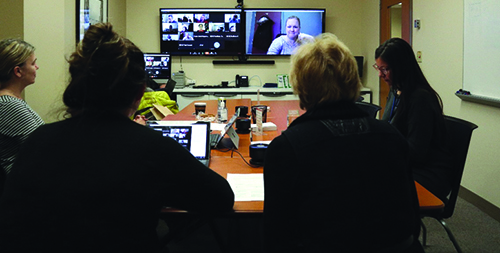Fall 2019 (Volume 29, Number 3)
ECHO Rheumatology:
Improving Access to Rheumatologic Care in Underserviced Areas Through Capacity Building
By Claire Bombardier, MD, FRCPC; Amanda Steiman, MD, MSc, FRCPC; Rhonda Mostyn, ECHO Project Manager; and Jane Zhao, MSc, ECHO Research Coordinator
Download PDF
Overview
ECHO (Extension for Community Healthcare Outcomes) is a collaborative model of medical education and care management, linking health care providers in far-flung communities with interprofessional specialist teams at urban centers. The ECHO model uses videoconference technology to create a virtual learning group during weekly sessions.
ECHO supports the delivery of the right care at the right time for many complex and common clinical conditions. This model started in New Mexico for Hepatitis C, and has expanded globally, riding on evidence of success for providers and patients. There are now sixteen ECHO programs running in Ontario, with three offered at University Health Network (UHN): Rheumatology, Chronic Pain, and Liver.
Who We Are
In January 2017, UHN in Toronto launched ECHO Rheumatology. Drs. Claire Bombardier and Amanda Steiman co-lead the program with the aim of transferring knowledge, while building confidence and skills to treat rheumatological conditions across the province. The interprofessional specialist team includes three rheumatologists (Claire Bombardier, Amanda Steiman, and Wes Fidler), two ACPAC (or Advanced Clinician Practitioner in Arthritis Care) physiotherapists (Mandy McGlynn and Laura Passalent), one registered nurse (Anne Cymet), one nurse practitioner (Elizabeth Lee), and two pharmacists (Carolyn Whiskin and Jadie Lo).
How ECHO works
ECHO Rheumatology videoconference sessions are on Fridays from 12:00 to 1:30 pm Eastern. Each session is CME-accredited and comprised of a brief didactic presentation on topics related to rheumatology management in primary care, followed by patient case discussions.
All patient cases are real, de-identified and presented by the health care provider participants. The patient cases are where the bulk of the learning occurs. They serve as a springboard for roundtable discussion of differential diagnosis, approaches to workup and treatment, and management.
The practical consequence is both local and wide-reaching. Locally, the provider learns how to take next steps in a patient’s workup and management; more broadly, the other participants take away an approach to similar problems in their respective clinics. Thus, unlike traditional telemedicine, which impacts only the participating provider and their patient, ECHO leverages the sessions to foster a one-to-many community.
ECHO Rheumatology eliminates frustration felt by providers and patients alike, who endure lengthy waiting times to see a rheumatologist. Outcomes from ECHO programs have measured provider improvements in confidence, skills and competence related to rheumatologic management. Providers learn how to initiate workup, formulate a differential diagnosis, manage patients on DMARDs, manage patients with non-pharmacological approaches like exercise, and collaborate effectively with rheumatologists. It reflects a true symbiosis.
After attending ECHO Rheumatology, a family doctor in northern Ontario said, “I feel now that a patient can come into my office and I can make a reasonable estimate about the probability that this person has an inflammatory arthritic condition, maybe even an issue of treatment to make a clear diagnosis, certainly make a much more coherent attempt at diagnosing them.”
How do I join ECHO?
- Register at uhn.echoontario.ca/register/.
- Attend a live, weekly videoconference session.
- Participate in group discussions, receive fast-track consults from a group of interprofessional specialists.
- Receive no-cost CME credits.

The interprofessional specialist team and community-based healthcare providers meet for their weekly ECHO session.
Claire Bombardier, MD, FRCPC
Professor of Medicine, University of Toronto
Senior Scientist, Toronto General Research Institute,
University Health Network
Rheumatologist, Mount Sinai Hospital
Co-Chair, ECHO Rheumatology
Toronto, Ontario
Amanda Steiman, MD, MSc, FRCPC
Assistant Professor of Medicine, University of Toronto
Clinician in Quality and Innovation
Rheumatologist, Sinai Health System/
University Health Network
Co-Chair, ECHO Rheumatology
Toronto, Ontario
Rhonda Mostyn
Project Manager, ECHO at UHN
Toronto Rehabilitation Institute
University Health Network
Toronto, Ontario
Jane Zhao, MSc
Research Coordinator, ECHO at UHN
Toronto Rehabilitation Institute
University Health Network
Toronto, Ontario
|




